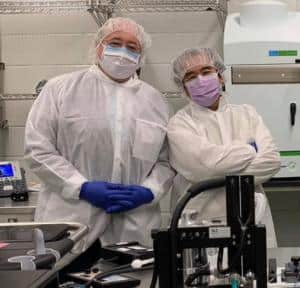Drs. Carrick and Sugaya in their lab at UCF College of Medicine ORLANDO, FLORIDA, UNITED STATES, August 25, 2021 /EINPresswire.com/ -- Researchers at
ORLANDO, FLORIDA, UNITED STATES, August 25, 2021 /EINPresswire.com/ — Researchers at the University of Central Florida College of Medicine (UCF COM) in Orlando, Florida, have discovered a new technology to accelerate wound-healing using specially designed ceramics wrapped in a rubber blanket fabricated for them by Gladiator Therapeutics. Their findings were accepted for presentation at the Military Health System Research Symposium (MHSRS), scheduled in Kissimmee, Florida, Aug 23-26, 2021. The MHSRS is the USA Department of Defense’s premier scientific meeting that focuses specifically on the unique medical needs of the Warfighter. The meeting was just canceled due to the current surge in the Delta Variant of COVID-19 and the extremely large number of delegates scheduled to attend. However, abstracts of the UCF COM research are published on the MHSRS website as a public service by the United States Army Medical Research and Development Command. The research abstracts will also be published in supplements in the Journal of Military Medicine and the Journal of Trauma & Acute Care Surgery.
The UCF team studied wound healing in a mouse model that simulated the wounds that are suffered in combat situations. They found that wounds healed significantly faster when animals were placed on the novel ceramic blanket. The new ceramic blankets do not need a power supply and are ideally suited for use in combat situations or civilian applications without the need for electricity.
The lead author of the study, Dr. Frederick R Carrick, Professor of Neurology at the College of Medicine at UCF, stated that the effect was due to the emission of low-intensity far-infrared rays (FIR) from the ceramic blankets. The ceramic blankets absorb energy from a subject that is wounded and transmits that energy as a novel emission that increases wound healing at the cellular level. Dr. Carrick related that the findings help explain clinical observations on improved wound healing when this ceramic blanket is used in the treatment of diabetic patients with chronic non-healing wounds. Large wounds, such as those suffered in combat are easily infected and may result in increased suffering, disability, and death amongst Warfighters. Healing wounds faster can decrease pain and suffering and save lives.
The UCF researchers have recently developed a new Alzheimer's therapy by combining drugs that affect stem cells that increase the development of brain cells and improve brain function. They are also the first to transplant stem cells isolated from the human brain to aged rats where they showed increased development of new brain cells and improvement of cognition. They are presently working on developing a new treatment for glioblastoma multiforme (a type of brain cancer) using gene therapy with a unique delivery system. Dr. Carrick emphasized that their research focus has been to develop stem cell therapies for neurodegenerative diseases, including Alzheimer's disease, Parkinson's disease, wound healing, and ALS. They took this knowledge and applied it to testing the ceramic blanket on animal wounds and by examining stem cells that were wounded experimentally. They found that the stem cells would also heal faster after being injured when placed on the ceramic blanket.
Dr. Kiminobu Sugaya, Professor of Medicine at the UCF COM and Head of the Neuroscience Division at the Burnett School of Biomedical Sciences, is excited about their findings. Dr. Sugaya stated that one of the benefits of using the Gladiator ceramic blanket is that it can be used anywhere without the need for a power supply and without the side effects that are commonly found when injecting chemicals or drugs. The UCF research team is conducting ongoing research on the use of the Gladiator ceramic blanket in animal models of Alzheimer's disease, Parkinson's disease, and traumatic brain injury.
Further information on the study may be obtained by contacting the principal investigator, Dr. Frederick R Carrick at drfrcarrick@post.harvard.edu.
Dr. Frederick R Carrick
University of Central Florida
+1 321-868-6464
drfrcarrick@post.harvard.edu
![]()
